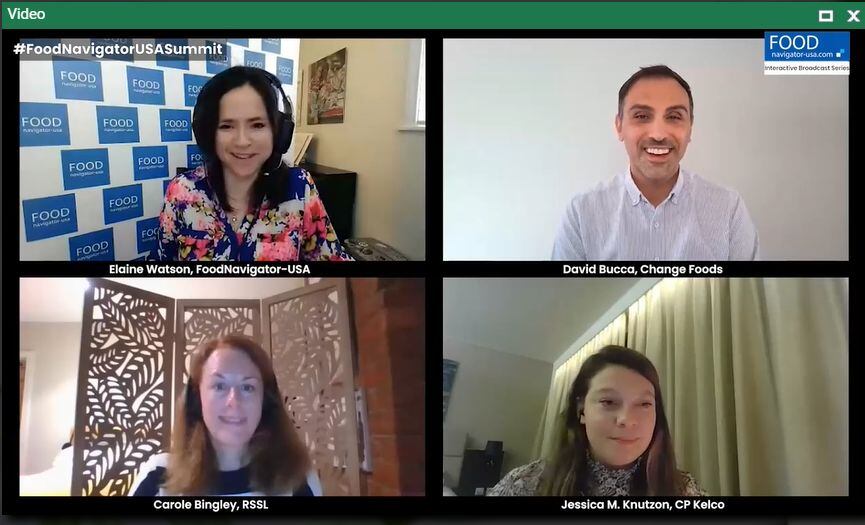Speaking during a panel session on formulation challenges in dairy alternatives (now available on demand if you register here, click on the grey 'on demand' tab, then 'login' to the session), David Bucca said:
“The opportunity [for ‘animal-free’ dairy] is huge, and that was very apparent even when I started the company. Within a few months I was getting calls from large dairy companies, which blew me away.
“A lot of them have equipment already to process these ingredients [whey and casein]. And when you look at the cost base of doing business for dairy processing, for example, a lot of cheese manufacturers spend 50% of their costs just removing water from milk,” added Bucca, a former aerospace engineer who moved into the dairy business (minus the cows) in summer 2019.
The casein micelle: 'The easiest analogy I like to use is an egg'
In dairy cheese, he said, casein is mission critical to structure, texture, and taste, and while there have been solid improvements in plant-based cheeses in recent years, no one has yet found something that quite matches casein.
“Dairy is really complicated, with many different structural components, one of them being the casein micelle,” explained Bucca.
“The easiest analogy I like to use is an egg. There are four casein [types] which make up that egg. You've got the hydrophilic casein, which encapsulates the micelle, which is like the eggshell that allows it to suspend itself in liquid milk, and then you've got three hydrophobic caseins within that micelle.
“And really what you're doing during traditional milk fermentation and cheese making is adding the starter culture, which effectively denatures that eggshell, like you're cracking the egg, and then you're releasing the hydrophobic caseins within, which then bind together and form the curd, which is what you need to make solid cheese.”
'Do you need all of the caseins? Not necessarily...'
So do you need all four types of casein for every cheese product? And what about whey?
“If you want to retain most of the curd in something like a hard cheddar it's predominantly all casein,” he said. “For cheese like ricotta or cottage cheese, you're retaining some of the moisture, which is the whey protein, so whey protein can be used depending on the type of cheese you're looking to recreate.
“Do you need all of the caseins? Not necessarily. It depends on your cheese making process and what style of cheese you’re making.”
'In cheese, there are what we call structural fats and aromatic fats'
But what about the other components in cheese aside from proteins? Can you use plants to make these, or is Change Foods looking to precision fermentation (engineering microbes such as yeast, fungi or bacteria) to produce other ingredients as well as caseins?
“In cheese,” said Bucca, “there are what we call structural fats and aromatic fats. Structural fats, you can really probably get that functionality from plant-based sources quite effectively like coconut or palm oil, although these have sustainability and consumer issues, but you can find some pretty good fractionated and fairly flavorless oils now on the market which can provide that structural performance.
“However, when you look at cheese flavor, there is something very unique about the fats, as they ripen through the curds, and a lot of them do govern the taste and experience that consumers are having when they eat a piece of cheese. So that is something we're exploring. How can we use our technology to replicate that experience beyond just the protein itself?”
RSSL scientist: 'I really do see precision fermentation as something that's truly disruptive'
Speaking on the same panel, Carole Bingley, senior associate principal scientist at RSSL, which works with companies around the globe in plant-based dairy formulation, told us: “I really do see precision fermentation as something that's truly disruptive that is going to help provide some breakthroughs, particularly in the cheese sector.
“Cheese and yogurt depend so heavily on the unique characteristics of the proteins that exist in milk and so expecting plant proteins to behave in the same way is really challenging.”
'Many plant proteins are limited in their solubility'
She added: “Many plant proteins are limited in their solubility, and then they don't react in the same way when you acidify the product so as you drop the pH in a yogurt, which is what gives you the thickness and the creaminess because of the way the protein starts to change… you just don't see the same effect with plant proteins. So this is why the work that David's doing is so interesting
“What we're seeing with many of the vegan cheese alternatives is that they're very low in protein and the proteins tend to give quite a gritty mouthfeel and can interrupt the structure of the product, so mainly products have been based on fat so a lot of them use coconut oil together with starches, so they’re also not delivering on the nutritional front.”
When it comes to flavor, meanwhile, she said, “We have hundreds of different cheeses and even within a single type of cheese, the number of flavor compounds generated through the fermentation process is huge, and it's really difficult to just take a flavor and pop it in and give that complexity that you get from fermentation.
“Products are improving all the time and there's a lot of work going on in yeast extracts and bringing in those cheesy notes but there’s a long road ahead, I think.”
- Watch FoodNavigator-USA’s ‘Where next for Dairy Alternatives?’ webinar on demand here: If you’re already registered, click on the grey 'on demand' tab, then 'login' to watch the session. If you’re not yet registered, register here.

